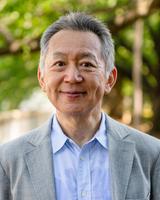イベント開催報告 エネルギー・環境
CIGS エネルギー環境セミナー "BIOENERGY IN BRAZIL: CURRENT STATUS AND FUTURE PERSPECTIVES"
2017年8月3日(木)
15:30
~ 17:00
開催
会場:キヤノングローバル戦略研究所 会議室3
これに対して、フロアからは、多様な燃料や燃焼方式が混在することには、現在の乗用車市場がそうであるように、一定の合理性があって、バイオエタノール乗用車の将来性にも希望があるのではないか、といった意見があり、活発な討論がなされました。
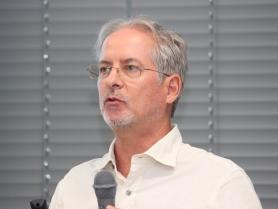
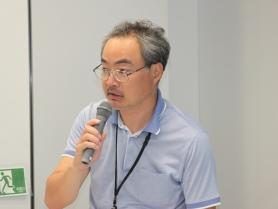
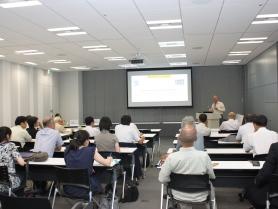
(左からシェーファー氏、杉山氏)
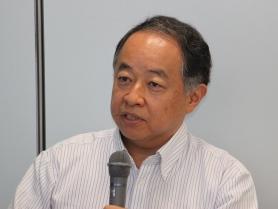
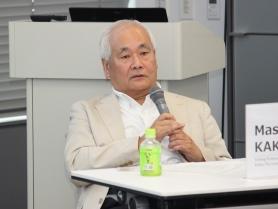
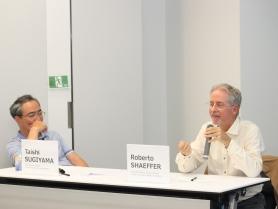
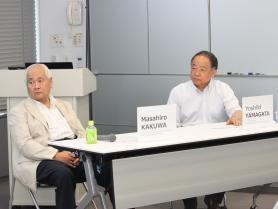
(左から山形氏、角和氏)
開催概要
題目:"BIOENERGY IN BRAZIL: CURRENT STATUS AND FUTURE PERSPECTIVES"
発表者:ロベルト・シェーファー(Associate Professor, Energy Economics, Federal University of Rio de Janeiro, Brazil)
モデレーター:杉山 大志 (キヤノングローバル戦略研究所 上席研究員)
ディスカッサント:山形 与志樹(国立環境研究所 主席研究員)
角和 昌浩(東京大学 公共政策大学院 客員教授)
開催趣旨
The successful inclusion of biofuels in the Brazilian fuels structure in the past years was the result of a combination of leverage mechanisms, which acted, simultaneously and comprehensively, in the different parts of the ethanol's and biodiesel's value-chains.
The Brazilian National Alcohol Program - Proalcool, launched in 1975, was based on several interventions by the federal government. After different phases, the increase in the production of ethanol starting in 2003 arose out of vehicles with "flexible" (flex-fuel) motors launched for sale in Brazil. Roughly 100% of all new light-duty vehicles sold in Brazil today are equipped with such engines. This acceptance comes from the fact that the "flex" car gives the consumer greater autonomy when choosing which fuel to buy at the service station, enabling drivers to opt for the fuel they prefer. Because of the flex fuel cars, and also due to the compulsory addition of anhydrous ethanol to gasoline (in a range of 20% to 27%), ethanol production continue to grow over time in the country.
On the other hand, launched in 2004, the National Program for the Production and Use of Biodiesel (PNPB) made it obligatory to add a fixed percentage of biodiesel to all mineral diesel sold in Brazil, which is currently 7% in volume. To a large extent, it was possible to bring forward the use of B7 by mobilizing the biodiesel's value-chain.
However, if the past and the present may have looked, or still look, bright for the biofuels industry in Brazil, the future looks very uncertain. Signals from many different fronts, both domestically and from abroad, point in the direction of an increasing electrification of the transport in Brazil over time, threatening the supremacy of the biofuels industry in the transport sector of the country.
This presentation aims to explore these different issues, and their possible consequences for the future of the biofuels sector in Brazil.
プログラム
ProgramPDF:239KB
発表資料
ロベルト・シェーファー 発表資料PDF:8,909KB
山形与志樹 発表資料PDF:887KB
発表者紹介
ロベルト・シェーファー
Dr. Roberto Schaeffer teaches and conducts research in the Energy Planning Program of the Federal University of Rio de Janeiro, Brazil, where he currently holds an Associate Professor position in Energy Economics. He holds a Ph.D. in Energy Management and Policy from the University of Pennsylvania (USA, 1990).
Dr. Schaeffer has already supervised 110 Master's dissertations and Ph.D. theses and published more than 200 scientific papers in the fields of energy and climate change. Previously to his current professional position, he was, for two years, between 1991 and 1993, a Visiting Professor at the Center for Energy and the Environment, and a Lecturer at the Wharton School, both at the University of Pennsylvania. In 2008 he occupied a Chair of Visiting Professor in Brazilian Studies, lecturing in five different Canadian universities with the support of the Ministry of Foreign Affairs and International Trade of Canada.
Between April 2002 and January 2011, Dr. Schaeffer was an Expert Member for the panel on guidelines for methodologies for baselines and monitoring plans for the United Nations Framework Convention on Climate Change Clean Development Mechanism (UNFCCC CDM Meth Panel).
Dr. Schaeffer was also a member of the International Energy Agency (IEA) Advisory Board on the IEA Accelerating Energy Technology Innovation Project in the period of June 2010-December 2011.
Since 2002, Dr. Schaeffer has been an International Adviser for the International Atomic Energy Agency (IAEA) on external assessment of the Agency's capacity building activities under its Sub-Programme C.1. on methodologies and analytical tools for sustainable energy development.
As of July 2014, Dr. Schaeffer began to serve, for a period of four years, on the Science Advisory Council (SAC) of the Stockholm Environment Institute (SEI), in Sweden, and to serve, for a period of three years, on the Science Advisory Committee (SAC) of the International Institute for Applied Systems Analysis (IIASA), in Austria.
Dr. Schaeffer has been contributing to the Intergovernmental Panel on Climate Change (IPCC) reports and assessments since 1998 both as a Lead-author (LA) and a Coordinating-lead-author (CLA).
As of 2014, Dr. Schaeffer is coordinating the most complete mitigation study ever developed for Brazil, the Global Environmental Facility (GEF)/PNUD-sponsored research project "Greenhouse Gas Mitigation Options in Key Sectors of Brazil," which will support the official Brazilian position during COP21, in Paris, in 2015.
In 2012 Dr. Schaeffer was awarded with two prizes in Brazil: Greenvana Greenbest 2012 Prize in the category "Personality of the Year," and Federal University of Rio de Janeiro COPPE's Giulio Massarani Academic Merit 2011 for outstanding academic records.
